#anti-atla
Text
there’s a reason why the entire story of avatar the last airbender begins and ends with katara. there’s a reason why we are introduced to katara first before we are introduced to any other character. there’s a reason why katara is the narrator. there’s a reason why the creators have emphasized over and over again that katara is just as titular to the story as aang - she’s the other main character.
when you water down katara - remove her compassion, her ability to connect with others, her nurturing role, her ANGER and RAGE and DRIVE - you water down the very fundamentals of the story. you drastically and severely alter the core dynamics of the gaang, because katara was so important to the development of every single one of them. she was the rock and glue that held team avatar together.
katara was unlike any other character to ever appear on television; she was a young brown girl who took no shit from anyone, yet at the same time remained kind and compassionate and nurturing. katara was a force of nature; proud of her heritage and culture, burdened by the responsibility of being the last southern water bender of the water tribe, angered over the death of her mother and everything that the fire nation took from her, determined to help every single person in need, determined to change the world, angry and resentful because old men and rules and laws kept telling her what she could or could not do, thus, she was determined to restructure thousands of years of patriarchy that stood against her from accomplishing her goals and dreams.
watering down katara into at most 2-3 tangible characteristics, stripping her away of all her motivation and agency and nuance, telling the audience that she wants to help and change the world only to have her stand in the background with an air of grief, demonstrates that the writers of the live action fundamentally misunderstand the spirit of avatar. and that’s something so unforgivable. no matter how many changes they decide to make, or how much they decide to stay true to the original story in other areas, no matter how many flashy VFX fight scenes we get - if you fail to properly understand katara, you fail to understand the heart and soul of avatar the last airbender, everything that makes avatar such a timeless classic.
21K notes
·
View notes
Text
I love Zutara as much as the next girlie, but I think people romanticizing Zuko catching Azula's lightning in the Final Agni Kai are doing Zuko's character a massive disservice. He would have done that for anyone. Not just anyone in the Gaang, anyone.
He did it for the division he ended up getting burned over. He did it for his subordinate that was going to fall to his death after the ship was struck by lightning. He did it for Lee, when he was kidnapped by Gao. He did it for Iroh, when he confronted his dad and tried to break him out of prison. He did it for the whole Gaang at the Western Air Temple. He did it for Sokka, Suki, and Hakoda at the Boiling Rock.
His whole character revolves around saving everyone else first. Hell, he tried to save Zhao of all people! There's no way that would have gone well for Zuko if Zhao had actually taken his hand. He always does what he thinks is right first before considering his own safety.
Zuko always saves other people. Even if, especially if, he can't save himself.
#look i love zutara#but zuko has no conception of personal safety#there are better zutara moments in atla!!!!#like i will absolutely still read fanfic that romanticizes that scene#but it still would have happened if literally anyone else had been standing there#zutara#zutara criticism#i'm going to tag this as#anti zutara#just in case someone doesn't want to see a critique of the ship#i'm not really critiquing the ship#but out of an abundance of caution#uh actual antis if you see this: behave yourselves lol#zuko#avatar the last airbender#atla
4K notes
·
View notes
Text
Ugh I will always love the concept of Katara using blood bending to revive Zuko after the last agni kai, mostly because it makes no sense to me that Zuko was able to bounce back so easily after being struck by lightning, but also because the way the show treats bloodbending is just odd to me. It was a defense mechanism created by a traumatized victim of some of the most devastating parts of colonization, and although I understand that Hama was supposed to symbolize the "bad parts" of waterbending and was important for Katara's growth in realizing that the world isn't entirely black and white, its still disappointing to me that the show never explored the gray areas of blood bending, especially since that episode was, as I stated above, about understanding the gray areas of the war. Katara using blood bending to revive Zuko would add so much to the last agni kai in demonstrating that she has truly realized that "good" and "evil" are relative concepts, and Zuko being saved by both a defense mechanism of a survivor of colonialism and a type of bending used to terrorize his people would have even added to his arc, as the narrative required him to save and subsequently be saved by the physical embodiment of everything his family sought to annihilate.
#also just the angst potential#there are so many fics and better metas written about this but I had to throw my two cents in#Bryke's refusal to acknowledge bloodbending as anything but evil incarnate is so fucking annoying#anti bryke#bloodbending#zutara#zuko#katara#final agni kai#atla#avatar the last airbender#atla meta#zutara meta#technically
2K notes
·
View notes
Text
Katara's Story Is A Tragedy and It's Not An Accident
I was a teenaged girl when Avatar: The Last Airbender aired on Nickelodeon—the group that the show’s creators unintentionally hit while they were aiming for the younger, maler demographic. Nevermind that we’re the reason the show’s popularity caught fire and has endured for two decades; we weren’t the audience Mike and Bryan wanted. And by golly, were they going to make sure we knew it. They’ve been making sure we know it with every snide comment and addendum they’ve made to the story for the last twenty years.
For many of us girls who were raised in the nineties and aughts, Katara was a breath of fresh air—a rare opportunity in a media market saturated with boys having grand adventures to see a young woman having her own adventure and expressing the same fears and frustrations we were often made to feel.
We were told that we could be anything we wanted to be. That we were strong and smart and brimming with potential. That we were just as capable as the boys. That we were our brothers’ equals. But we were also told to wash dishes and fold laundry and tidy around the house while our brothers played outside. We were ignored when our male classmates picked teams for kickball and told to go play with the girls on the swings—the same girls we were taught to deride if we wanted to be taken seriously. We were lectured for the same immaturity that was expected of boys our age and older, and we were told to do better while also being told, “Boys will be boys.” Despite all the platitudes about equality and power, we saw our mothers straining under the weight of carrying both full-time careers and unequally divided family responsibilities. We sensed that we were being groomed for the same future.
And we saw ourselves in Katara.
Katara begins as a parentified teenaged girl: forced to take on responsibility for the daily care of people around her—including male figures who are capable of looking after themselves but are allowed to be immature enough to foist such labor onto her. She does thankless work for people who take her contributions for granted. She’s belittled by people who love her, but don’t understand her. She’s isolated from the world and denied opportunities to improve her talents. She's told what emotions she's allowed to feel and when to feel them. In essence, she was living our real-world fear: being trapped in someone else’s narrow, stultifying definition of femininity and motherhood.
Then we watched Katara go through an incredible journey of self-determination and empowerment. Katara goes from being a powerless, fearful victim to being a protector, healer, advocate, and liberator to others who can’t do those things for themselves (a much truer and more fulfilling definition of nurturing and motherhood). It’s necessary in Katara’s growth cycle that she does this for others first because that is the realm she knows. She is given increasingly significant opportunities to speak up and fight on behalf of others, and that allows her to build those advocacy muscles gradually. But she still holds back her own emotional pain because everyone that she attempts to express such things to proves they either don't want to deal with it or they only want to manipulate her feelings for their own purposes.
Katara continues to do much of the work we think of as traditionally maternal on behalf of her friends and family over the course of the story, but we do see that scale gradually shift. Sokka takes on more responsibility for managing the group’s supplies, and everyone helps around camp, but Katara continues to be the manager of everyone else’s emotions while simultaneously punching down her own. The scales finally seem to tip when Zuko joins the group. With Zuko, we see someone working alongside Katara doing the same tasks she is doing around camp for the first time. Zuko is also the only person who never expects anything of her and whose emotions she never has to manage because he’s actually more emotionally stable and mature than she is by that point. And then, Katara’s arc culminates in her finally getting the chance to fully seize her power, rewrite the story of the traumatic event that cast her into the role of parentified child, be her own protector, and freely express everything she’s kept locked away for the sake of letting everyone else feel comfortable around her. Then she fights alongside an equal partner she knows she can trust and depend on through the story's climax. And for the first time since her mother’s death, the girl who gives and gives and gives while getting nothing back watches someone sacrifice everything for her. But this time, she’s able to change the ending because her power is fully realized. The cycle was officially broken.
Katara’s character arc was catharsis at every step. If Katara could break the mold and recreate the ideas of womanhood and motherhood in her own image, so could we. We could be powerful. We could care for ourselves AND others when they need us—instead of caring for everyone all the time at our own expense. We could have balanced partnerships with give and take going both ways (“Tui and La, push and pull”), rather than the, “I give, they take,” model we were conditioned to expect. We could fight for and determine our own destiny—after all, wasn’t destiny a core theme of the story?
Yes. Destiny was the theme. But the lesson was that Katara didn’t get to determine hers.
After Katara achieves her victory and completes her arc, the narrative steps in and smacks her back down to where she started. For reasons that are never explained or justified, Katara rewards the hero by giving into his romantic advances even though he has invalidated her emotions, violated her boundaries, lashed out at her for slights against him she never committed, idealized a false idol of her then browbeat her when she deviated from his narrative, and forced her to carry his emotions and put herself in danger when he willingly fails to control himself—even though he never apologizes, never learns his lesson, and never shows any inclination to do better.
And do better he does not.
The more we dared to voice our own opinions on a character that was clearly meant to represent us, the more Mike and Bryan punished Katara for it.
Throughout the comics, Katara makes herself smaller and smaller and forfeits all rights to personal actualization and satisfaction in her relationship. She punches her feelings down when her partner neglects her and cries alone as he shows more affection and concern for literally every other girl’s feelings than hers. She becomes cowed by his outbursts and threats of violence. Instead of rising with the moon or resting in the warmth of the sun, she learns to stay in his shadow. She gives up her silly childish dreams of rebuilding her own dying culture’s traditions and advocating for other oppressed groups so that she can fulfill his wishes to rebuild his culture instead—by being his babymaker. Katara gave up everything she cared about and everything she fought to become for the whims of a man-child who never saw her as a person, only a possession.
Then, in her old age, we get to watch the fallout of his neglect—both toward her and her children who did not meet his expectations. By that point, the girl who would never turn her back on anyone who needed her was too far gone to even advocate for her own children in her own home. And even after he’s gone, Katara never dares to define herself again. She remains, for the next twenty-plus years of her life, nothing more than her husband's grieving widow. She was never recognized for her accomplishments, the battles she won, or the people she liberated. Even her own children and grandchildren have all but forgotten her. She ends her story exactly where it began: trapped in someone else’s narrow, stultifying definition of femininity and motherhood.
The story’s theme was destiny, remember? But this story’s target audience was little boys. Zuko gets to determine his own destiny as long as he works hard and earns it. Aang gets his destiny no matter what he does or doesn’t do to earn it. And Katara cannot change the destiny she was assigned by gender at birth, no matter how hard she fights for it or how many times over she earns it.
Katara is Winston Smith, and the year is 1984. It doesn’t matter how hard you fight or what you accomplish, little girl. Big Brother is too big, too strong, and too powerful. You will never escape. You will never be free. Your victories are meaningless. So stay in your place, do what you’re told, and cry quietly so your tears don’t bother people who matter.
I will never get over it. Because I am Katara. And so are my friends, sisters, daughters, and nieces. But I am not content to live in Bryke's world.
I will never turn my back on people who need me. Including me.
#ATLA#Avatar the Last Airbender#Katara#Anti Bryke#Zutara#but not really#just pro-Katara#Anti Kataang
2K notes
·
View notes
Text

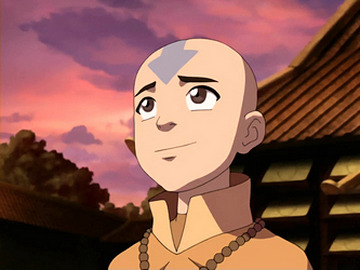
save me characters who are still hated and mischaracterized in 2024 for the sake of a fanon ship save meeeee
1K notes
·
View notes
Text
I’m sorry, but the Netflix showrunner referring to Kataang as an “issue to tackle” in the future is some of the funniest shit I’ve ever read/heard.
#the way I choked#he was directly referencing k@taang in his answer too.#the age gap was already a problem in the original show#now you just see it the way Zutara has the entire time because you see it in real life actors their age#the maturity difference between a 12 and 14 year old is insane#he literally said he was relieved he didn’t have to deal with it this season#and he just kept going too 😭#I’m not a fan of the ship but DAMN he did them so dirty#avatar the last airbender#zutara#atla live action#anti k@taang
2K notes
·
View notes
Text
Fanon:
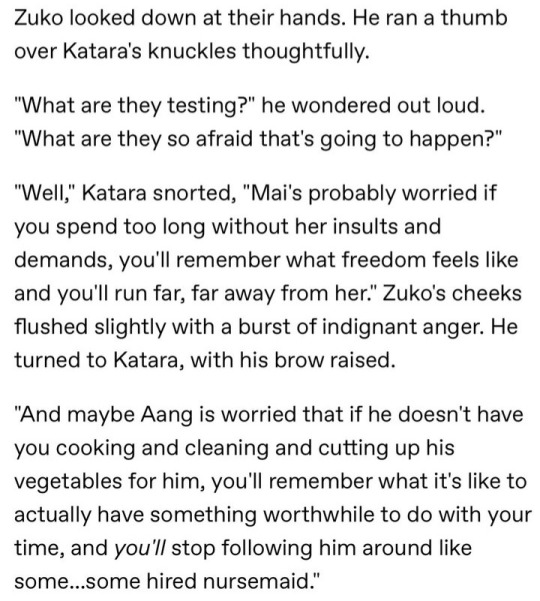
Canon:
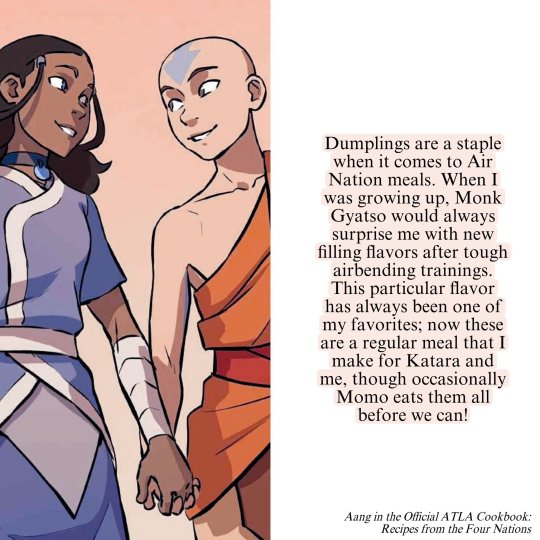
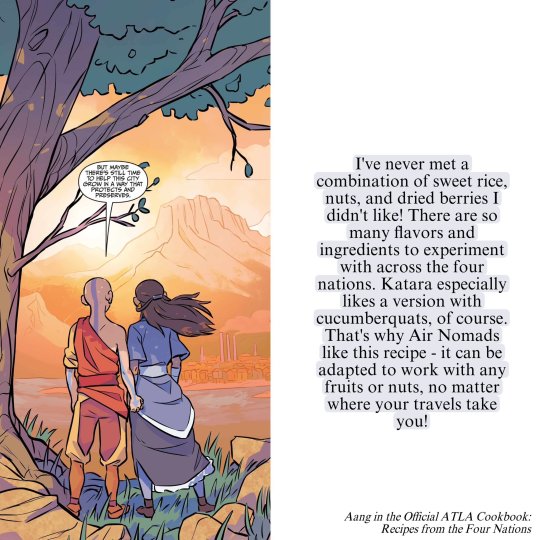
This man is a MALEWIFE
Another L for Aang's delusional haters
#avatar the last airbender#aang#katara#kataang#atla#another L for that fanbase#i will defend aang with my life#i'm so tired of these weirdos#LEAVE HIM ALONE#also the mai hate ewww#anti zut*ra#anti zu*o stans
3K notes
·
View notes
Text
I'm so tired of people telling those of us who are upset about the LA atla remake that we are "being too dramatic" or are just "finding things to be upset about". We are allowed to be upset that something that we love so dearly has been butchered, AGAIN. If you liked it, then that's your personal opinion, but don't sit here and tell those of us who didn't that we're the problem.
I personally think the CGI, costumes, and sets all look terrible. None of it is immersive. Sure, it LOOKS like atla, but it doesn't FEEL like atla. The heart of the og is gone, and people are allowed to be upset about this. They've altered characters to the point that they aren't the character anymore (looking at you Aang and Katara), which is a huge upset for me personally because Katara is one of my favorite characters ever. So watching her be turned into someone meek and docile is more than a slap to the face. Not to mention them removing her as the narrator as if Bryke themselves didn't state that Katara is the person the story is being told through. And before you start telling me that Aang is the same. No, he isn't. Major parts of his development through season 1 (him coming to terms with the fact that he's the avatar and embracing that role, and him also accepting the fact that he RAN AWAY and how he is never going to do that again, which is also pivotal to his character later on) are completely removed. And don't even get me started on what they did to Kataang. Regardless of whether you ship them or not, those 2 are deeply connected to one another from the start, and their relationship is a big part of the show, so to see that butchered is heartbreaking for me.
This isn't just about them "making some changes" or it not being a 1:1 adaptation. I'm fine with adaptations that aren't 1:1. What I'm upset about is that the changes they are making are VITAL changes to characters and dynamics between characters. They're rushing through the plot and condensing the story (and I will scream if I hear one more person say that it's because they couldn't fit it all in with their runtime. The runtime is an HOUR LONGER than the og, so yes, they did have the time). The changes they are making make it evident that they do not understand the og show, and if you don't feel like that, fine, once again, that's YOUR opinion, just as this is MY opinion. So stop telling us we have no right to be upset and that we just want to hate everything. That's not true. What is true is that we are expressing valid complaints about another bad adaptation of something dear to us.
Edit: If you also come at people who are upset bc they were expecting a faithful adaptation and didn't get it bc "its not supposed to be the cartoon," you're missing the whole point. An adaptation is ADAPTING SOMETHING from one medium to the other, not rewriting it. "Yall expected it to be just like the cartoon." No, I expected a FAITHFUL ADAPTATION and was met with poorly written fanfiction.
#atla#avatar the last airbender#natla#netflix avatar#katara#aang#kataang#never made a post before but it had to be said bc it was starting to make me mad#atla is my favorite show of all time#stop trying to dictate how i feel about the remake#there is no live action in ba sing se#anti natla#anti LA atla
2K notes
·
View notes
Text
keep seeing people make memes of "oh when the live action atla gets to ember island players–" lmao girlies what is this """when"""????????? you think these eight-episode cut-all-character-development no-self-awareness motherfuckers are going to put in the ember island players episode???? they didn't even have the fucking earthbender prison break episode you think they're gonna do ember island players? bitch they ARE the ember island players
1K notes
·
View notes
Text
I think that one of the reasons I hate zutara and I like zukka is because the zukka fandom is pretty much the opposite of the zutara fandom.
I've never ever seen a post where someone tries to prove that zukka should've been canon or that it IS canon. Zutara shippers take every scene between the two and over analyze everything to the point that it's exhausting and annoying.
Zukka shippers don't do that, and most of the fandom is just like, "Haha, what if these two kissed?" And honestly, I love that sm more than the over analyzing
2K notes
·
View notes
Text
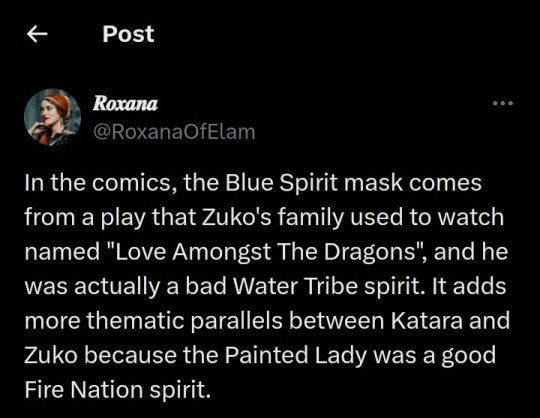
Zutara are parallels in every possible ways, yet they didn't end up together, and other shipper expect me to not upset about it?
2K notes
·
View notes
Text
I need everyone who defends natla's writing to raise their standards because the current entertainment industry takes advantage of your "anti criticism" mindset and gives us mediocre shit like this😭
#you can't defend character assassination by saying 'it's not supposed to be the same'#atla#avatar#avatar the last airbender#the last airbender#atla netflix#netflix atla#avatar netflix#netflix avatar#netflix#atla live action#atla remake#live action avatar#live action atla#atla fandom#natla#natla critical#anti atla live action#anti netflix atla#anti atla netflix
977 notes
·
View notes
Text
Look I know people love to act like Zuko is the most dangerous, toxic, and temperamental character… but there is exactly one (1) male character Katara was canonically responsible for calming down from violent, destructive tantrums at risk to herself and it wasn’t Zuko… 🐸☕️
#another overlooked toxic trope tbh#zutara#atla#zuko#katara#aang critical#anti kataang#canon critical
728 notes
·
View notes
Text
Zutara, romance novels, and the female gaze
Okay so I’ve been thinking about the female gaze a LOT so I checked out a subreddit about romance novels, despite never having read one. I came across this meme (which was initially a Tumblr post and then got posted to Instagram and then to Reddit and I’m now bringing back to Tumblr — Internet telephone, pls never change):
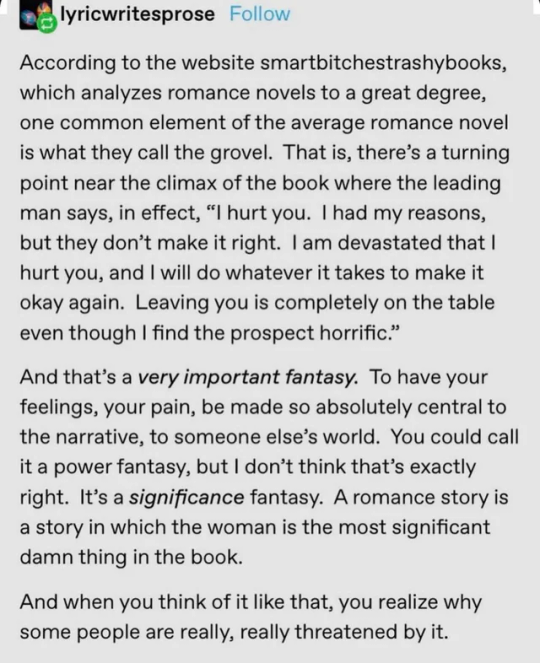
And…what is The Southern Raiders, if not a platonic grovel? Katara’s pain is central to the episode. It’s central to Zuko. Zuko asks Katara what he can do to make up for his betrayal; she demands the impossible. He reads between the lines, cockblocks her brother to get the necessary information, and then waits outside her door overnight (which he also did for Iroh, the one person we know for sure he loves). He basically makes himself a receptacle for her rage, and he holds space for her by coming with her on her revenge quest and carrying their bags and not saying a damn thing about what she should and should not do beyond like…asking her to rest. And obviously the grovel works! She forgives him and then they’re thick as thieves, bantering and fighting and saving each other’s lives, etc.
On a different note, I’ve been told that enemies to lovers is one of the biggest tropes in romance novels, similar to YA lit and fanfic. Here’s something else I found in the romance novel discourse:
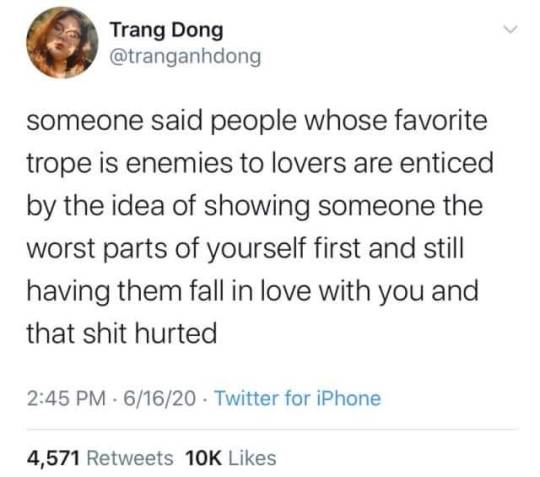
And…yeah. In TSR, Katara really does show Zuko her worst self, because she doesn’t feel the need to perform for him. She doesn’t feel the need to perform moral perfection OR cold blooded vengeance. She bloodbends in front of him and he just goes with it. She doesn’t kill Yon Rha and he just goes with it. He doesn’t treat her any differently afterwards. Maybe they talk about it off screen, but I kind of like the idea that they don’t, because Katara doesn’t need to explain anything.
And it’s so interesting, because some people in the ATLA fandom have a totally different read on TSR. They think Zuko was encouraging Katara to get revenge (by what, keeping his mouth shut?), and that Aang is the one who acts as her moral compass. I believe that either Bryan or Mike said in the DVD commentary that Aang is the angel on her shoulder the entire time. And this interpretation does make sense if you see it from the male gaze, where Katara as an object of affection is acting in an angry, irrational, threatening way. But if you see it from the female gaze, you recognize that actually it’s probably the most emotionally taxing experience Katara has to go through, and she doesn’t owe it to be nice or perfect to anybody. Katara’s formative trauma literally comes to a head, and she has to make a decision — no, a discovery — about who she is in relation to the tragedy that defines her life and even her identity (as a waterbender, as a parentified child who becomes the mom friend, as a genocide victim), and she’s accompanied by someone who trusts her judgement and validates her feelings.
I’m not saying TSR is explicitly romantically coded, but when it conforms so well to romance novel tropes…is it any wonder that so many people thought “yes this is her man?” And then he takes lightning in the heart for her and reaches for her when he’s literally dying, I will never be normal about that either
#Zutara#Katara#Zuko#the southern raiders#Pro zutara#anti Bryke#I guess#I swear I’m not a Bryke anti but I feel like they just don’t get#The female gaze#and the fact that Zutara is so female gaze is kind of an accident and I find that fascinating#atla fandom critical#The southern raiders turned me into a Zutara shipper#one ep away from the finale#Zutara meta#My meta
1K notes
·
View notes
Text
I don’t know how to say this tactfully, but I’ll do my best.

If other fans online have convinced you to see the gentle, optimistic, empathetic, fun loving, whimsical, forgiving, wise beyond his years genocide survivor, as a sexist, racist, xenophobic, abusive, pro-colonization, sexual assault perpetrator who doesn’t care about anyone else and doesn’t understand trauma…
You have been LIED TO.
Please just think for a moment!
ATLA was banned in China from the beginning for a reason. Because they didn’t want anyone empathizing with a character based on Tibetan monks. Why? Because they are an actual oppressed and persecuted minority IRL. Their religious leader lives in exile. Their second most important spiritual figure is the youngest political prisoner ever taken (and to this day no one knows if he’s alive or dead!). China has actual prison and labor camps. Tibetan people get sent there for “re-education”.
Can you please think about what these “fans” are saying when they stomp all over this allegory in TLA and try to frame Aang as the oppressor?
Do you really think it’s appropriate or these people who call Aang all these horrible (and inaccurate) things are being in anyway fair when they call Aang “white coded”???
Even without the real world context, Aang is explicitly the only survivor of a genocide. The last of his people. He has lost more than anyone else in the entire franchise. There’s a reason he clings so hard to Appa.
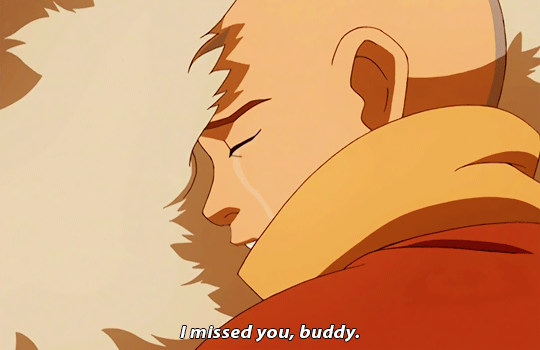
Do you think it’s fair to compare a 12 year old misreading signals and trying to kiss a girl who already consensually kissed him before, and immediately backing off and giving her space when she says no, to rape?
Tweens and teens miscommunicating and trying to comfort each other with kisses, only to realize that’s not what their friend needed and immediately backing off is the same as having your body violently violated against your will? The same as having your “no” ignored?
How do you think this makes survivors feel? To see people use their experiences as a shield and cudgel for ship discourse? It certainly upsets me as someone who experienced intimate partner violence, let me tell you! And I know I’m not the only one.
And how is it in anyway feminist or pro-Katara to ignore her own agency and deep love she shows for Aang? Yes, that includes her own crush on him! It IS reciprocated!
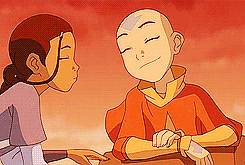
Lastly, you don’t need to demonize Aang to ship whatever you want to ship. Please understand that the majority of these takes are bad faith and born out of bitterness and insecurity over a friggin FANON SHIP.
And none of it is necessary! You can ship whatever you want! You don’t need permission or excuses. You can just ship them! You can make your case for why you like another pairing better without misrepresenting what happened in the show and what these characters are like, let alone what they represent.
There’s already plenty to work with in the show as it is! Otherwise why bother?
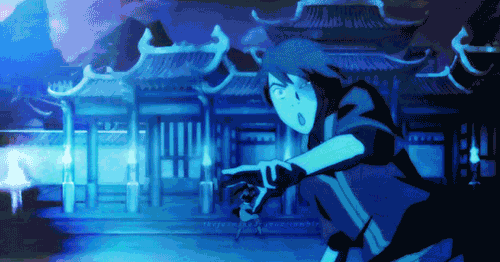
I’m imploring fans taken in by persuasive and manipulative metas to please just think about it. Get off social media and rewatch the show for yourself thoughtfully.
It doesn’t need to be like this.
624 notes
·
View notes
Text

We know
Except on tumblr and TikTok
653 notes
·
View notes